朗文4A Unit 2-3
朗文英语听说教程答案
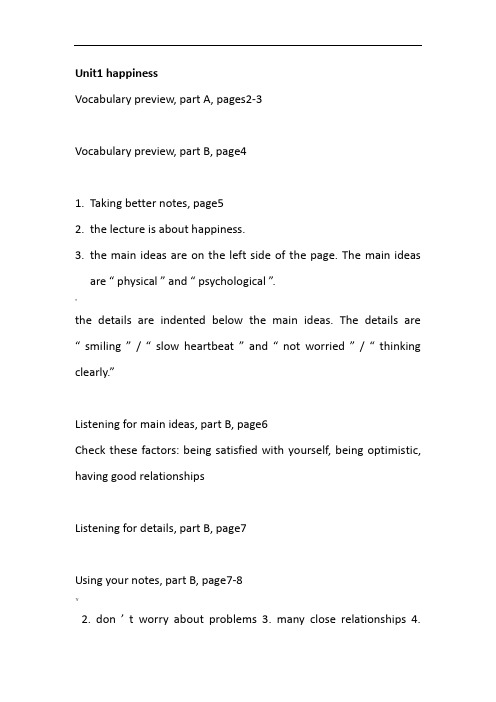
Unit1 happinessVocabulary preview, part A, pages2-3Vocabulary preview, part B, page41.Taking better notes, page52.the lecture is about happiness.3.the main ideas are on the left side of the page. The main ideasare “ physical ” and “ psychological ”.*the details are indented below the main ideas. The details are “ smiling ” / “ slow heartbeat ” and “ not worried ” / “ thinking clearly.”Listening for main ideas, part B, page6Check these factors: being satisfied with yourself, being optimistic, having good relationshipsListening for details, part B, page7Using your notes, part B, page7-8¥2. don ’ t worry about problems3. many close relationships4.family and friends 5. always want to change 6. lose weight 7. assume things will get worse 8. worry about their problems 9. new friends 10. work too muchUnit 2 new kinds of foodVocabulary preview, part A, pages 11-1210bVocabulary preview, part B, page12·Vocabulary preview, part C, page131.Taking better notes, pages 13-142.this lecture is about growing organic food.3.the notes are divided into benefits and riskstwo benefits and two risks are listedlistening for main ideas, Part B, page15(benefits: a b drisks: b c e1.listening for details, part B, page15 corning your notes, part B, page162.corn kills insects that eat the plant.3.{4.grow better.5.tomato stays fresh for two months.6.dominate other plants.7.corn can hut butterflies that live nearby. harmful to people.Unit 3 public art$Vocabulary preview, part A, pages 19-2010aVocabulary preview, part B, page20 Vocabulary preview, part C, page 211.Taking better notes,2.<3.the name of the sculpture is knot.4.cosimo cavallaro made it.5.knot was made in 1996. it is 10 feet by 16 feet by 8 feet andweighs 2,400 pounds. It is made of rusted steel.the sculpture symbolizes human feelings and confusion.Listening for main ideas, Part B, page24and cherry【Listening for details, part B, page24ing your notes, part B, page252.public art is usually outdoors in public places. It is becomingmore popular.3.one purpose of public art is to make cities more beautiful andinteresting and let people enjoy art.4.one example is spoonbridge and cherry. It is a huge metalsculpture. It is silver and red. It ’ s an example of pop art, which is art about everyday things.5.another purpose of public art is to illustrate concepts or topromote beliefs.6.}7.one example is peace. It is a statue of a woman on a horse, and itis a realistic statue. It is a symbol of peace.another example is non-violence. It is a metal sculpture. It looks like a gun tied in a knot. This is impossible, so this sculpture is an example of surrealism. Its purpose is to promote peace.Unit4 journey to AntarcticaVocabulary preview, part B, page28Taking better notes, pages29-30~7/1907 4.10/29/1908 5.>2 mos .1/9/1909Listening for main ideas, part B, page 311 4 32 6 7 5Listening for details, part B, page323F 4F 5T 6T 7F 8F&Using your notes, part B, pages32-332 3 oct. 27 9 5 may 20 6 aug. 30Unit 5 violence on televisionVocabulary preview, part A, pages 36-371a 2a 3b 4b 5c 6b 7c 8a 9c 10aVocabulary preview, part B, page 371a 2a 3b 4b 5a【Vocabulary preview, part C, page381 act2 long-term3 average4 focused5 impact 6estimate 7 characters 8 immediate 9 assess 10 linkTaking better notes, pages 38-39Answers will vary.Listening for main ideas, part B, page394231Listening for details, part B, page 401c 2a 3b 4a 5c 6b 7c 8b@Using your notes, part B, page41Almost 98% of American families have a television.Cartoons have more acts of violence than adult TV shows.A child sees about 100000 acts of violence by age 12.When children watch a lot of TV, they are more violentUnit6 too old to learnVocabulary preview, part B, page44<1f 2c 3g 4h 5a 6j 7c 8b 9i 10dVocabulary preview, part C, page451 remove2 adolescents3 skill4 evidence5 conclude6 theory7 native8 period9 accent 10 criticalTaking better nots, pages45-461 L12 L2 3. Diff between L1+L2Listening for main ideas, part B, page471b 2b 3cListening for details, part B, page48.1a 2b 3a 4c 5bUsing your notes, part B, page491 animals or humans2 to sing3 hear parent ’ s song4 to see5 have light6 to speak without accent7 be youngUnit7 are we aloneVocabulary preview, part A, page 52Paragraph 11c 2b 3d 4a。
香港朗文4A单词及句子.xls
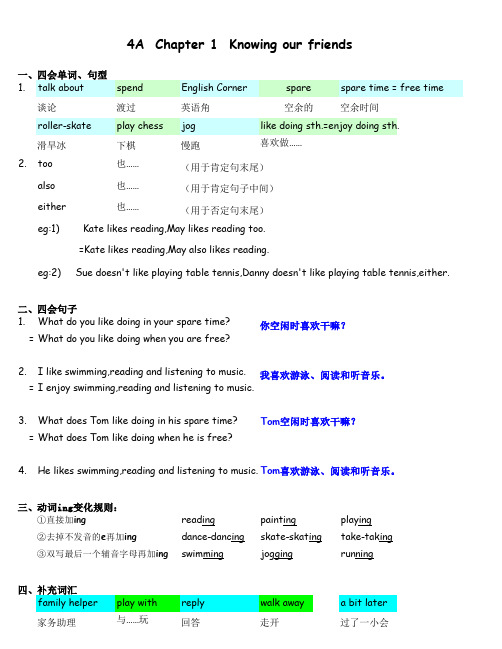
4A Chapter 1 Knowing our friends一、四会单词、句型1.talk about spend English Corner spare spare time = free time谈论 渡过英语角空余的空余时间roller-skate play chess jog like doing sth.=enjoy doing sth.滑旱冰下棋慢跑喜欢做……2.too也……(用于肯定句末尾)also也……(用于肯定句子中间)either也……(用于否定句末尾)eg:1) Kate likes reading,May likes reading too.=Kate likes reading,May also likes reading.eg:2) Sue doesn't like playing table tennis,Danny doesn't like playing table tennis,either.二、四会句子1.What do you like doing in your spare time?你空闲时喜欢干嘛?=What do you like doing when you are free?2.I like swimming,reading and listening to music.我喜欢游泳、阅读和听音乐。
=I enjoy swimming,reading and listening to music.3.What does Tom like doing in his spare time?Tom空闲时喜欢干嘛?=What does Tom like doing when he is free?4.He likes swimming,reading and listening to music.Tom喜欢游泳、阅读和听音乐。
三、动词ing变化规则:①直接加ing reading painting playing②去掉不发音的e再加ing dance-dancing skate-skating take-taking③双写最后一个辅音字母再加ing swimming jogging running四、补充词汇family helper play with reply walk away a bit later家务助理与……玩回答走开过了一小会solve puzzle sadly boring notes解决疑惑伤心地沉闷键盘piano slide swing钢琴滑梯秋千the youth center book dispiay central library 青少年活动中心书展中心图书馆sport centre City Hall city plaza体育活动中心市政厅市民广场4A Chapter 2 More about our friends一、四会单词和短语look after go to bed early late eat out get up 照顾,照看上床睡觉早迟外出用餐起床surf the Net play the recorder play the violin often sometimes always 上网吹直笛拉小提琴常常有时总是usually once twice never ever通常一次两次从不曾经二、三会单词polite same spilt(spill过去式)有礼貌相同的溢出angry invite friendly生气邀请友善的take photos cookbook wish拍照烹饪书希望三、四会句子1.Do you ever tidy your room?你曾经整理你的房间吗?yes,I usually tidy my room.是的,我经常整理我的房间。
最新朗文英语4a第二课

More about our friends 1. 知识点分析。
ever never sometimes often usually always的区分:ever 曾经,表示经历过某事。
I ever surf the Net.Do you ever look after your pets?你照顾过你的宠物吗?never 从来不表示从来没有做过某件事。
I never go to Beijing.我从来没有去过北京。
She never eats out.她从不出去吃饭。
sometimes 有时候表示做过某事,但次数不多。
★-★★I sometimes get up late. 我有时候起得晚。
(很少)often 经常表示做过某事,次数较多,但比 usually 少。
★★★-★★★★ I often go to bed late. 我经常很晚睡觉。
usually 通常表示经常做某事。
(基本形成习惯)★★★★★--★★★★★★I usually get up early.(我基本上都是早起,很少晚起)always 一直表示某件事情已经成为习惯,每天都在做。
★★★★★★★I always et up early.(我一直起得早,没起晚过)句型:1. 你曾经………吗?Do you ever …..? Yes, I do./ No, I don’t.2. XX曾经……吗?Does Jenny ever ……? Yes, she does./No.she doesn’t.1 Do you ____ get up late? Yes , I _____ (有时候) get up late.2 _____ he _____ surf the Net? No, he never ____ the Net..3 ______ you ever ________(照顾) your pet?4 This ___ (是)my _________(知己),Ken.5 she always _____ to bed ______.(早)6 do you ever ______________________(收拾房间)中译英B1. 我经常和朋友去外面玩。
香港朗文4A Unit 1-2 综合习题(2)

Unit 1-2 综合习题一.翻译词组打乒乓球__________________________踢足球__________________________做运动__________________________弹钢琴__________________________拉小提琴__________________________玩音乐__________________________上网__________________________照顾宠物__________________________外出吃饭__________________________听音乐__________________________整理房间__________________________下象棋__________________________二.据要求写句子。
1. Billy likes roller-skating. (改成否定句)______________________________________________________________2. 空闲时间你喜欢做什么? (将句子翻译成英语)___________________________________________________________3. Does she ever play the recorder? (否定回答)_____________________________________________________________4. don’t ,I ,either ,like ,listening to music(连词成句)_____________________________________________________________5. 我也不喜欢踢足球.(翻译成英语)______________________________________________________________三.看图完成下列句子提示词:do does everA: Do you ever get up late?B: _______, I never get up late.A: _________ Ben ________ play table tennis?B: _______, he __________ plays table tennis.四.选词填空dance paint jog read swim roller-skate(1)I like reading.(2)I like __________. (3) I like ____________.(4)I like __________. (5) I like __________. (6) I like _____________.五.看表格选词填空(sometimes, always, never, usually, often)1.Grandpa _____________________ plays the piano.2.Mum _______________ cooks for our family.3.David ______________ looks after the cat.4.Grandma _______________ surfs the Net.5.Dad _________________ gets up late.SUN MON TUE WEN THU FRI SATGrandpa√√√√Mum√√√√√√David√√√√√√√Grandma√√DadA: _________ you ________ go to bed early?B: _______, I ________ go to bed early.A: _______ you _______ play football?B: _______, I ________ ________ _____________.A: _______ Peter ever ___________________?B: _______, he __________________________.A: ___________________________________?B: ___________________________________.。
香港朗文四年级4A第二单元达标练习题
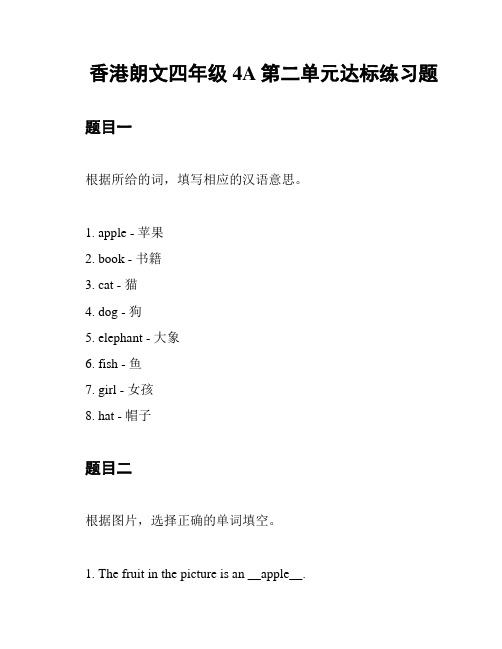
香港朗文四年级4A第二单元达标练习题题目一根据所给的词,填写相应的汉语意思。
1. apple - 苹果2. book - 书籍3. cat - 猫4. dog - 狗5. elephant - 大象6. fish - 鱼7. girl - 女孩8. hat - 帽子题目二根据图片,选择正确的单词填空。
1. The fruit in the picture is an __apple__.2. The object in the picture is a __book__.3. The animal in the picture is a __cat__.4. The animal in the picture is a __dog__. 题目三选择正确的单词填入句子中。
1. I have a pet __dog__.2. She has a cute __cat__.3. He likes to eat __fish__.题目四连线,将英文单词和图片相匹配。
题目五根据问题选择合适的答案。
1. What is your favorite fruit?a) appleb) catc) dogAnswer: __a)__ apple2. What is your favorite animal?a) bookb) catc) hatAnswer: __b)__ cat3. What do you read?a) fishb) girlc) bookAnswer: __c)__ book 题目六写出图片对应的单词。
Answer: __fish__Answer: __girl__Answer: __hat__以上为香港朗文四年级4A第二单元达标练习题,共计800字。
朗文4AChapter3复习提要

朗文英语4A》复习提要Chapter 3:When our grandparents were young当我们爷爷奶奶(外婆外公)小的时候I. 经过第3章的学习,下面的新单词我们要准确无误地读 (read them correctly),知道它们的中文意思(know the Chinese meaning),不看书进行英汉互译(translate),并且还要会拼写(spell)。
*注意:an air-con 一台空调II. 句型。
下面的关键句型我们要会读(read), 知道意思(know the Chinese meaning), 会根据不同的语境来运用(use them in different contexts,)会写(write them correctly)。
-- Was there any cola when you were young,Grandpa?-- Yes, there was. (肯定回答)-- Was there any fast food when you were young?-- No, there wasn' t(. 否定回答)-- Were there any air-cons when you were young, Grandma? -- Yes, there were.(肯定回答)-- Were there any mobile phones when you were young, Grandma? -- No, there weren 't.(否定回答 )总结:当名词是可数名词单数或不可数名词时, be 动词用单数 (is , was)。
当主语是可数名词的复数时 , be 动词用复数( are, were )。
总 结如下:is/was + 不可数名词 / 可数名词单数are/were + 可数名词复数some 和 any 的用法如下:some 用在肯定句中 一些 any 用在疑问句或否定句中 *注意:Grandpa 和 Grandma 一般用语口语称呼, 其结构一般是“⋯,Grandpa/Grandma ”。
(完整word版)香港朗文4A总结U1-U7
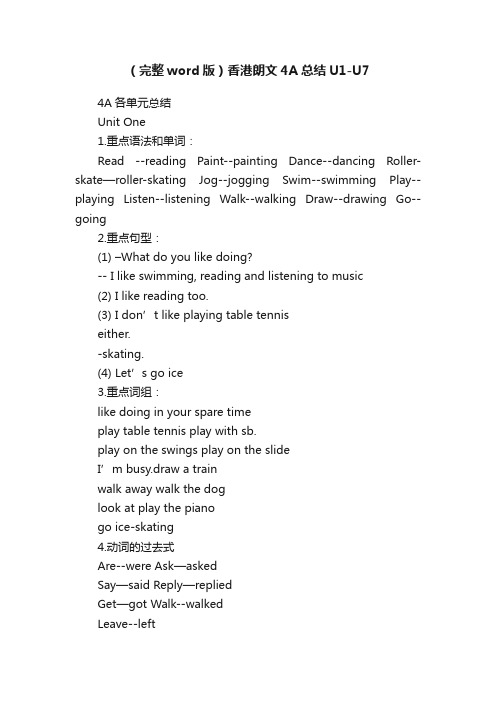
(完整word版)香港朗文4A总结U1-U74A各单元总结Unit One1.重点语法和单词:Read --reading Paint--painting Dance--dancing Roller-skate—roller-skating Jog--jogging Swim--swimming Play--playing Listen--listening Walk--walking Draw--drawing Go--going2.重点句型:(1) –What do you like doing?-- I like swimming, reading and listening to music(2) I like reading too.(3) I don’t like playing table tenniseither.-skating.(4) Let’s go ice3.重点词组:like doing in your spare timeplay table tennis play with sb.play on the swings play on the slideI’m busy.draw a trainwalk away walk the doglook at play the pianogo ice-skating4.动词的过去式Are--were Ask—askedSay—said Reply—repliedGet—got Walk--walkedLeave--leftGo—wentThink--thoughtUnit two1.重点语法和单词:Always Usually OftenSometimes Never2.重点句型:(1)--Do you ever tidy your room?-- Yes, I usually tidy my room.(2)—Does she ever play the violin?-- No, she never plays the violin.-- No, she doesn’t play the violin.3.重点词组:look after your pets go to bed earlytidy your room eat outget up late surf the Netget angry talk to sb.take photos invite sb. to one’s homeam/is/are good at something show one around look around go into the dining roomenjoy the meal play a lot of musicplay the recorder play the pianoplay the violin play a lot of sportplay pingpong play table tennisplay football watch football matches4.动词的过去式say—said talk—talkedcan—could ask--askedthink—thought show--showedhave—had call—calledwill--would enjoy--enjoyedspill—spilled/spilttake--tookgo--wentUnit Three1.重点语法:am/is/are--was are--were ask--asked like--likedfly--flew make--made flick--flicked want--wantedcatch--caught draw—drew stay--stayed happen--happened put--put say--said Play--playedhave/has--had hit--hitkeep--kept go--wentlose--lost do--didwin--won2.重点单词和词组:cola fast food CDscomics clocks air-consmobile-phones rickshaw an oil lampclogs camera fanstove play computer games fly kitesplay hopscotch make nets catch butterfliesplay marbles draw a circle on the groundgo out of the circle want to +动词原形flick the shooter into thecirclego out a lot of credit cardswear trainers have telephones check your answerask someone3.重点句型:(1)--Was there any cola when you were young?-Yes, there was.(2)The game I like best was marbles.(3)How do you play marbles?(4)– Did you wear trainers fifty years ago?--Yes, I did.(5)—Did you have a telephone?-- No, I didn’t. Rich people had telephones at home but poor people didn’t.(6 ) – Did you shop at the supermarket?--- No, I didn’t. There weren’t any supermarkets.(7) – Did you go to school?-- No, I didn’t. Rich children go to school but poor children didn’t.(8) –Did you listen to the radio?-- Yes, I did.Where(哪里)do you like going to in your holiday?How(如何)do you help at home?How much (多少钱,提问不可数名词)is it? --- It is five dollars.How many (多少,提问可数名词)books in your home?What time(什么时间)is it?What(什么)are you doing now? ----I am doing my homework.What(什么)is the weather like today? ----It’s windy.What color (什么颜色)is it? ---- It is red.What (什么)are you? ( What do you do?) -----I am a driver.When(什么时候)is your birthday? ---on 2nd MayHow old(多大)are you? ----I am ten.Who (谁) are you? -----I am David.Which(哪一个) club do you want to join?Why(为什么)do you like playing football?----Because I like being healthy.Unit Four1.重点单词和词组:cotton clothes silk clothes a horse a sedan chair silver and gold paper money a village a town do one’s homework feel sleepy after a while fall asleep strange friendly missWhy don’t you post office explain suddenly wake upcelebrate cook with firewood Ride horses Travel by sedan chair Chinese NewYearTravel by boat Send letters Rich people supermarket Cook with gasLook tired This is fun Live in flats Keep in touch with Be away fromhome2.动词过去式:wear—wore ride—rode travel—travelled walk—walked feel—felt take—took miss—missed write—wrote explain—explained wake—woke3.重点句型(1)How did people travel?——Most/Rich/Some people travelled by boat/sedan chair.(2)What did people wear?——Most/Rich people wore cotton clothes/silk clothes.(3)May I use your phone?(4)Why don’t you+动词原形(5)How do you want to send your letter?——By...... .(6)Were there any supermarkets?——No,there weren’t.Unit Five:1.重点单词词组science museum a horse a camel a giraffe an owla peacock an eagle a hippo leader come forwardwise look after talk about eel sharkdolphin starfish crab come down breakdirection scary feather noisy hairy tiny wolf crocodile penguin parrotbee fly cockroach shiny silver2.单词过去式meet—met come—came say—said speak—spoke catch—caughtswim—swam shout—shouted break—broke save—saved3.形容词比较级最高级Tall-taller-tallest Heavy-heavier-heaviestBig-bigger-biggest Small-smaller-smallest Pretty-prettier-prettiestFast-faster-fastest Strong-stronger-strongestGood-better-best Long-longer-longest4.重点句型(1)The horse, the camel and the giraffe are tall.The camel is taller than the horse.The giraffe is the tallest.(2)I’m stronger than all of you.Unit Six:1.重点单词和词组villages islands temples crocodiles snakesa boat trip a camel trip a helicopter trip a waterfall a rivera cave at the beach proud powerful show offshow sb around country politely an hour a thick jungle different plant huge later fly overmountain dangerous fantastic too tired at the beginningof restaurant activity enjoyable exciting wonderful2.形容词比较级最高级interesting-more interesting-the most interesting exciting-more exciting-themost excitingpowerful-more powerful-themost powerfulbeautiful-more beautiful-the most beautifuldangerous-more dangerous-the most dangeroushigh-higher-highest nice-nicer-nicest wide-wider-widest light-lighter-lightest3.重点句型(1)We visited some interesting places.The villages were more interesting than the temples.The islands were the most interesting.(2)Let me show you around my country.Let sb +do(动词原形)(3)Isn’t it big?——Yes, it’s huge.(4)Are we near your home yet?——Oh,no.It’s still a long way away.Unit Seven1.单词词组汇总learn a lesson character list forest insect busyquickly slowly work hard collect build a newhomebright light up path naughty loudlysoftly match carefully careless Don’t worry drop burn down be afraid of warn Look out get away speak angrily steal dirty rubbish bin clean up stranger fly off2.过去式light—lighted(lit)drop—dropped burn—burned steal—stole fly—flew happen—happenedstart—started try—tried get—got3.重点句型(1)The insects are busy today,aren’t they?——Yes,they are.(2)What are they?——They are......(3)Did you steal the matches?——Yes,I did.(4)Why did you fly off with the burning match?——Because I.......。
香港朗文小学英语4A-Chapter2-More about our friends
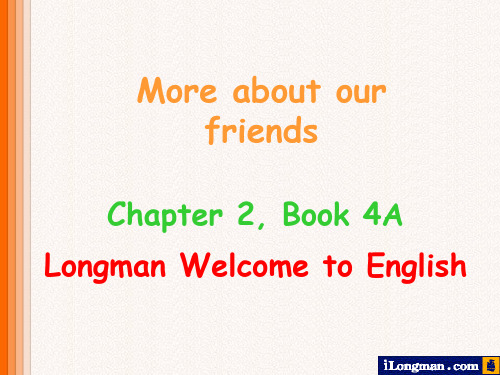
Simple Present Tense
+ s Mary feeds her dog. Peter enjoys the food. Tim always cooks the dinner. Tim watches TV every night. May usually dresses in pink. Bob never washes his car. The baby cries every night. Peter carries a heavy bag. Tina dries the dishes every day. (feed) (enjoy) (cook) (watch) (dress) (wash) (cry) (carry) (dry)
Practice
Monday Tuesday Wednesday Thursday Friday
Do you ever play the violin? Yes, I usually play the violin.
Practice
Sunday Wednesday Friday
Does Bob ever look after his younger brother? Yes, he often looks after his younger brother.
2 9 16 23
3 10 17 24 31
July
4 11 18 25
5 12 19
6 13 20
26 27
29 30
Tim and Sally sometimes play cards.
The words always, usually, often, sometimes, or never show how often things happen.
- 1、下载文档前请自行甄别文档内容的完整性,平台不提供额外的编辑、内容补充、找答案等附加服务。
- 2、"仅部分预览"的文档,不可在线预览部分如存在完整性等问题,可反馈申请退款(可完整预览的文档不适用该条件!)。
- 3、如文档侵犯您的权益,请联系客服反馈,我们会尽快为您处理(人工客服工作时间:9:00-18:30)。
What else would you like for breakfast?
Review & , usually, often, sometimes, or never show how often things happen.
Language usage
• 中译英: 1.玛丽邀请我到她的生日派对。
Mary invited me to her birthday party.
2.弟弟带我参观了他的学校。
My brother showed me around his school.
3. 下课后,我的老师找我谈话。
My teacher talked to me after class.
Key sentences
1. That’s all right. = That’s OK. (没关系)
2. What else do you like doing? (别的) 3. Would you like to come to my home?
4. That ’s very kind of you! 你真好!
T or F
( T )6. Peter invited Bill to his home. ( T )7. Peter likes reading. ( F )8. Bill never eats out. ( T )9. Peter likes cooking for his family. ( F )10. Judy is Bill’s sister.
1.完成Grammar practice P7-8。 2.完成Reading & Writing P5-8。
Thank you! Thank you
never
Turn to Page 10
I always look after my pets. I usually go to bed early. I usually tidy my room. I often eat out. I sometimes get up late. I never surf the Net.
Part C
Read silently and finish the exercises.
T or F
( T )1. Peter and Bill have painting class together. ( F )2. Bill is unfriendly. ( T )3. Peter wants to be friends with Bill. ( F )4. Bill isn’t good at art. ( F )5. Peter likes taking photos.
How often You use …
100% always
Examples
Dad always cooks the dinner.
usually
often
Mum usually gets up early.
Cindy often surfs the Net.
sometimes
0%
Tim sometimes tidies his room. Bob never goes to school late.
Do you ever ____________? Yes, I usually ___________ . No, I never _____________.
Does he/she ever _________? Yes, he/she usually ________. No, he/she never _________.
Longman 4A
How my friends have fun? (Part G P16)
Passing game (击鼓传花游戏)
• When music begins, students should pass the ball one by one till the music stop. • The students who get the ball should say a phrase about hobby,e.g. look after your pets.
Read aloud
模仿并朗读
Language points
spilt 溢出 think-thought想 invite …to 邀请 be good at 擅长做某事 talk to 与某人谈话 after class 下课后 take photos 照相 on Sunday 星期天 stay for dinner留下来吃晚饭 show …around带某人参观 look around 环顾四周 have a good idea 想到一个好办法
